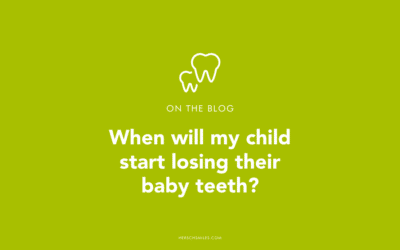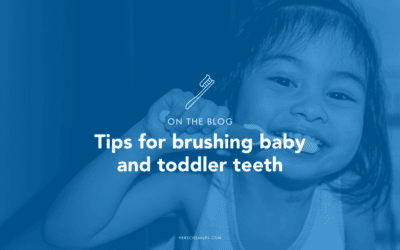As a parent, you probably swap saliva with your baby more times than you think. Their big wet kisses are hard to resist. The pacifier that dropped on the ground may need a blow from mom or dad before being passed back to baby. And probably more times than most, you’ll give your baby a bite of food off of your fork. It’s all innocent, right? Not quite.
Swapping saliva means swapping bacteria
According to a 2008 study in Pediatric Dentistry, strong evidence demonstrated that mothers are a primary source of MS [mutans streptococci] colonization of their children. This bacteria can be easily passed from person to person through the transfer of saliva, such a sharing utensils, blowing on food, and yes, even kissing on the mouth.
The main thing to know is that tooth decay is a bacterial infection and you can spread it from one person to the other during the window of infectivity, which is during infancy and especially during the time of tooth eruption. This is when the teeth are most vulnerable. It’s as if you had a bad cold and were kissing your child, you would spread the cold virus.
There’s some good news
Only parents (or caregivers) with active tooth decay can spread the bacteria through the transfer of saliva. This is why it’s important for mom and dad to receive regular dental checkups and practice excellent oral hygiene. Also consider this: tooth decay is caused by a combination of factors including: the transfer of infectious saliva, genetics, oral hygiene, and feeding practices (such as letting your baby constantly suck on a sippy cup of juice, milk, or other sugar-filled liquids).
There’s some bad news
Baby teeth are vulnerable to decay. When teeth first erupt, the enamel is very soft. They’re brand new surfaces and very susceptible to bacteria. If this bacteria is allowed to thrive, they will colonize and stick around for years, attacking permanent teeth when they come in too.
Here are some simple tips to help prevent the transfer
- Cut back on saliva-transferring behaviors such as utensil sharing, toothbrush sharing, blowing on baby’s food, and cleaning off the pacifier with your own mouth.
- Maintain good oral practices and diet for your children and yourself
- Schedule your baby’s first dentist visit 6 months after their first tooth erupts or by the age of one.
Hopefully, we helped shine a little light on this little-known topic. As always, if you have any questions feel free to contact us or schedule a consultation.







